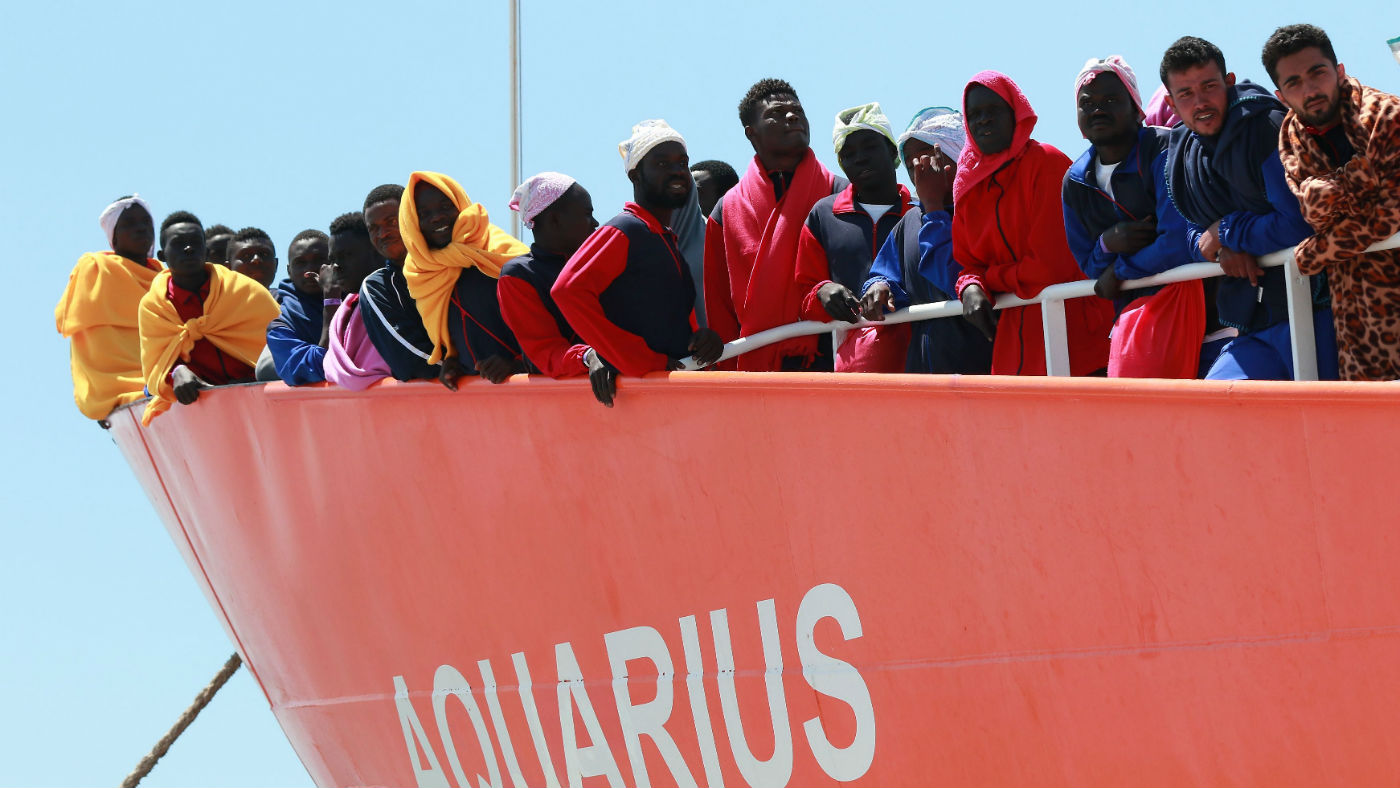MS Aquarius: why did Spain accept the disputed migrant ship?
New socialist prime minister avoids humanitarian crisis and diffuses political stand-off

A free daily email with the biggest news stories of the day – and the best features from TheWeek.com
You are now subscribed
Your newsletter sign-up was successful
Spain has accepted a rescue ship carrying 629 migrants which had been turned away by the new Italian government, avoiding a humanitarian crisis and diffusing a political stand-off between two EU countries.
In a statement the country’s new prime minister, Pedro Sanchez, said he had given permission for the MS Aquarius to dock in Valencia, adding his country would welcome all those on board.
Sanchez went on say that “It is our duty to help avoid a humanitarian catastrophe and offer a safe harbour to these people in accordance with international law.”
The Week
Escape your echo chamber. Get the facts behind the news, plus analysis from multiple perspectives.

Sign up for The Week's Free Newsletters
From our morning news briefing to a weekly Good News Newsletter, get the best of The Week delivered directly to your inbox.
From our morning news briefing to a weekly Good News Newsletter, get the best of The Week delivered directly to your inbox.
The decision by the new socialist Spanish government provides a stark contrast to that of its Italian counterpart, which on Sunday took the drastic step of refusing entry to the ship.
Italy’s new interior minister and leader of the far-right League, Matteo Salvini, said on Sunday all Italian ports were closed to Aquarius, and insisted the boat should instead dock in Malta.
“Malta takes in nobody. France pushes people back at the border, Spain defends its frontier with weapons. From today, Italy will also start to say no to human trafficking, no to the business of illegal immigration,” he wrote on Facebook.
Sky News says “the refusal - a realisation of tough anti-immigration promises made by Italy's new government - left those on board in mortal danger and prompted a diplomatic spat over the future of migrants travelling across the Mediterranean”.
A free daily email with the biggest news stories of the day – and the best features from TheWeek.com
The move was widely condemned by humanitarian groups, with reports that mayors across southern Italy, including in Palermo and Naples, had pledged to defy Salvini’s move and open up their city’s ports to the ship.
However, the European Commission, “anxious to avoid feeding the new Italian government’s anti-EU narrative, took a softer line” reports The Guardian, “calling on Italy and Malta to consider the humanitarian needs of those on board but insisting the matter was outside its control”.
Around 600,000 people are believed to have reached Italy by boat from Africa since the start of the migrant crisis five years ago, with as many as half a million estimated to still be in the country.
While Spain's willingness to take in the Aquarius has surprised many observers, for the new Spanish government “it does make political sense for several reasons” says the BBC’s Guy Hedgecoe.
“The move solves a potentially thorny problem for the European Union, bolstering Pedro Sanchez's hopes of becoming an influential leader within the bloc”, he says.
It also distances Sanchez from the legacy of his conservative predecessor, Mariano Rajoy, and “is likely to impress left-leaning parties such as Podemos which were instrumental in voting the Socialist in to office on 1 June, and whose support he still needs” says Hedgecoe.
-
 Political cartoons for February 15
Political cartoons for February 15Cartoons Sunday's political cartoons include political ventriloquism, Europe in the middle, and more
-
 The broken water companies failing England and Wales
The broken water companies failing England and WalesExplainer With rising bills, deteriorating river health and a lack of investment, regulators face an uphill battle to stabilise the industry
-
 A thrilling foodie city in northern Japan
A thrilling foodie city in northern JapanThe Week Recommends The food scene here is ‘unspoilt’ and ‘fun’
-
 Epstein files topple law CEO, roil UK government
Epstein files topple law CEO, roil UK governmentSpeed Read Peter Mandelson, Britain’s former ambassador to the US, is caught up in the scandal
-
 Iran and US prepare to meet after skirmishes
Iran and US prepare to meet after skirmishesSpeed Read The incident comes amid heightened tensions in the Middle East
-
 Israel retrieves final hostage’s body from Gaza
Israel retrieves final hostage’s body from GazaSpeed Read The 24-year-old police officer was killed during the initial Hamas attack
-
 China’s Xi targets top general in growing purge
China’s Xi targets top general in growing purgeSpeed Read Zhang Youxia is being investigated over ‘grave violations’ of the law
-
 Panama and Canada are negotiating over a crucial copper mine
Panama and Canada are negotiating over a crucial copper mineIn the Spotlight Panama is set to make a final decision on the mine this summer
-
 Why Greenland’s natural resources are nearly impossible to mine
Why Greenland’s natural resources are nearly impossible to mineThe Explainer The country’s natural landscape makes the task extremely difficult
-
 Iran cuts internet as protests escalate
Iran cuts internet as protests escalateSpeed Reada Government buildings across the country have been set on fire
-
 US nabs ‘shadow’ tanker claimed by Russia
US nabs ‘shadow’ tanker claimed by RussiaSpeed Read The ship was one of two vessels seized by the US military